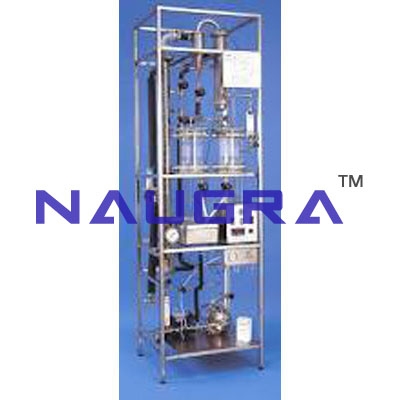- Civil Lab Mechanical Lab Engineering Lab Equipments
- sales@didacticlabequipments.com

CAT NO: DIDACTICNLE-Export-210060
Rising Film Evaporation- Engineering Lab Training Systems.
Technical Description
Evaporators are used in process
engineering and food technology for increasing the concentration of
solutions. Part of the solvent is removed by evaporation, which means
that the solution retains a higher concentration of dissolved solids.
Film evaporators are used in particular for temperature-sensitive
solutions such as milk.
The CE 715 allows the operating behaviour
of a rising film evaporator to be investigated. The untreated solution
is fed from the feed tank below into the evaporator. The evaporator is a
double pipe heat exchanger that is heated by steam. The steam pressure
on the casing side is adjusted with a PID controller. A cyclone is
installed after the evaporator to separate the evaporated solvent and
the concentrated solution. The solvent vapour removed is condensed in a
water-cooled condenser and collected in a tank. The concentrated
solution can also be collected in a tank or fed back into the evaporator
for the concentration to be increased further.
The two tanks, the
cyclone and the condenser are made of glass for better observation. The
system can also be operated under a vacuum to reduce the boiling point
of the solvent. The evaporation pressure, heating steam pressure,
relevant temperatures and flow rates are recorded to allow evaluation
and monitoring of the process.
To clean the system while installed, a pump and cleaning nozzles are fitted in the condensate and concentrate tanks.
Common
salt and water are the recommended cleaning materials. allows the
operating behaviour of a rising film evaporator to be investigated. The
untreated solution is fed from the feed tank below into the evaporator.
The evaporator is a double pipe heat exchanger that is heated by steam.
The steam pressure on the casing side is adjusted with a PID controller.
A cyclone is installed after the evaporator to separate the evaporated
solvent and the concentrated solution. The solvent vapour removed is
condensed in a water-cooled condenser and collected in a tank. The
concentrated solution can also be collected in a tank or fed back into
the evaporator for the concentration to be increased further.
The two
tanks, the cyclone and the condenser are made of glass for better
observation. The system can also be operated under a vacuum to reduce
the boiling point of the solvent. The evaporation pressure, heating
steam pressure, relevant temperatures and flow rates are recorded to
allow evaluation and monitoring of the process.
To clean the system while installed, a pump and cleaning nozzles are fitted in the condensate and concentrate tanks.
Common salt and water are the recommended cleaning materials.
